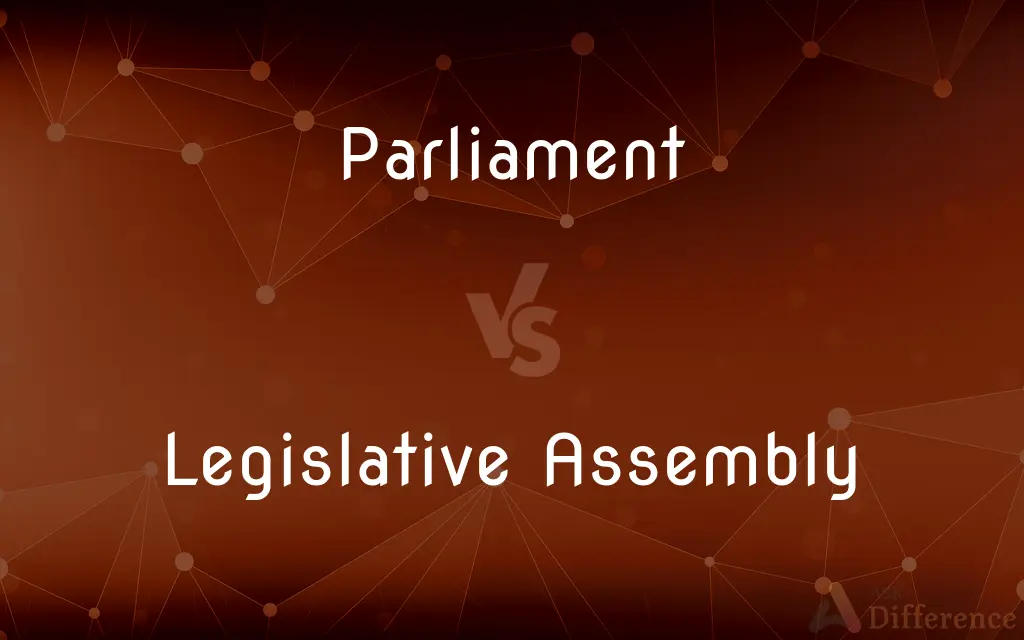Parliament vs. Legislative Assembly — What's the Difference?
Edited by Tayyaba Rehman — By Fiza Rafique — Published on November 19, 2023
Parliament is a supreme legislative body in a country, often bicameral. Legislative Assembly is a lower house or the sole legislative body in certain regions/states.

Difference Between Parliament and Legislative Assembly
Table of Contents
ADVERTISEMENT
Key Differences
Parliament typically refers to the supreme legislative body in a country, responsible for making national laws. Legislative Assembly, on the other hand, is a term that denotes a lower house or, in some cases, the sole legislative body at a state or regional level.
In many countries, the Parliament consists of two houses: an upper and a lower house. This bicameral system is designed to provide a check and balance in the legislative process. The Legislative Assembly doesn’t always have a complementary upper house, and its powers can vary significantly based on the constitutional structure of the country or region.
Members of Parliament (MPs) are elected to represent the interests of the entire nation and participate in national lawmaking. Members of the Legislative Assembly (MLAs or similar titles) are chosen to represent specific constituencies within a state or region, focusing on local issues and laws.
The authority and functioning of both Parliament and Legislative Assembly are typically defined by a country's constitution or other foundational laws. While the Parliament enacts laws that have nationwide implications, the Legislative Assembly is confined to making decisions within its jurisdiction, unless otherwise specified.
In summary, while both Parliament and Legislative Assembly are involved in the law-making process, their scope, jurisdiction, and structure can vary considerably based on the country or region's governance framework.
ADVERTISEMENT
Comparison Chart
Level
National
State/Regional
House System
Often bicameral (two houses)
Typically unicameral (one house)
Jurisdiction
Nationwide
Within a specific state or region
Members
MPs (Members of Parliament)
MLAs (Members of Legislative Assembly)
Authority Source
Country's Constitution or foundational laws
State constitution or specified regional laws
Compare with Definitions
Parliament
An institution where legislative functions are exercised, often consisting of two houses.
The bill was approved by both houses of the Parliament.
Legislative Assembly
An elected group of representatives addressing regional or state-level issues.
The Legislative Assembly passed a resolution to enhance local transportation.
Parliament
A supreme legislative body in a country.
The Parliament passed a bill to improve national infrastructure.
Legislative Assembly
A primary legislative body in certain states or regions.
The Legislative Assembly of Texas discussed the state's education budget.
Parliament
The highest authority in making national laws and policies.
The proposal to amend the constitution will be presented in the Parliament.
Legislative Assembly
A body that drafts and enacts laws specific to its jurisdiction.
The Legislative Assembly introduced regulations to promote sustainable agriculture in the region.
Parliament
A gathering of elected members who represent the interests of a nation's citizens.
Many young activists are aiming to be elected to the Parliament to bring about change.
Legislative Assembly
The lower house in some bicameral systems.
The bill, after being passed by the Legislative Assembly, moved to the upper house for approval.
Parliament
A representative body having supreme legislative powers within a state or multinational organization.
Legislative Assembly
An institution representing the people of a particular region or state, focusing on local governance.
Residents voiced their concerns, hoping the Legislative Assembly would address them.
Parliament
Parliament The national legislature of the United Kingdom, made up of the House of Lords and the House of Commons.
Parliament
A formal council summoned (especially by a monarch) to discuss important issues.
Parliament
In many countries, the legislative branch of government, a deliberative assembly or set of assemblies whose elected or appointed members meet to debate the major political issues of the day, make, amend, and repeal laws, authorize the executive branch of government to spend money, and in some cases exercise judicial powers; a legislature.
Parliament
A particular assembly of the members of such a legislature, as convened for a specific purpose or period of time (commonly designated with an ordinal number – for example, first parliament or 12th parliament – or a descriptive adjective – for example, Long Parliament, Short Parliament and Rump Parliament).
Following the general election, Jane Doe took her oath of office as a member of the nation's fifth parliament.
Parliament
A gathering of birds, especially rooks or owls.
Parliament
(historical) Parliament cake, a type of gingerbread.
Parliament
A parleying; a discussion; a conference.
But first they held their parliament.
Parliament
A formal conference on public affairs; a general council;
They made request that it might be lawful for them to summon a parliament of Gauls.
Parliament
The assembly of the three estates of the United Kingdom of Great Britain and Ireland, viz., the lords spiritual, lords temporal, and the representatives of the commons, sitting in the House of Lords and the House of Commons, constituting the legislature, when summoned by the royal authority to consult on the affairs of the nation, and to enact and repeal laws.
Parliament
In France, before the Revolution of 1789, one of the several principal judicial courts.
Parliament
A legislative assembly in certain countries (e.g., Great Britain)
Parliament
A card game in which you play your sevens and other cards in sequence in the same suit as their sevens; you win if you are the first to use all your cards
Parliament
An assembly of representatives chosen by the public to discuss and decide on national issues.
The Parliament debated on the new tax reforms for weeks.
Common Curiosities
What are the main components of a Parliament?
In bicameral systems, a Parliament typically consists of two houses: an upper house (like the House of Lords in the UK) and a lower house (like the House of Commons in the UK).
What functions does a Parliament serve?
It makes and amends laws, scrutinizes and oversees the executive branch, allocates funds, and represents the interests of the public.
What is a Parliament?
A Parliament is the supreme legislative body in countries with a parliamentary system, responsible for making laws, scrutinizing the government, and representing the interests of the public.
Can the Parliament be dissolved?
Yes, in many parliamentary systems, the head of state or the executive can dissolve the Parliament, triggering a general election.
How is it different from a Parliament?
While a Parliament may refer to the entire legislative body, a Legislative Assembly often denotes a specific house within that body, especially in bicameral systems.
How is it different from a Congress?
While both are legislative bodies, "Parliament" is commonly used in parliamentary democracies like the UK and Canada, whereas "Congress" is used in presidential systems like the US.
How are members of Parliament (MPs) chosen?
MPs are typically elected by the public in general elections or by-elections.
How does a bill become law in a Parliament?
A bill typically goes through multiple readings and stages in both houses of Parliament, followed by assent from the head of state.
Are members of a Legislative Assembly elected?
Yes, members are typically elected by the public in designated constituencies.
What's the role of the Prime Minister in a Parliament?
The Prime Minister is usually the head of government and leader of the majority party or coalition in the lower house of Parliament.
Are all Parliaments bicameral?
No, some countries have unicameral Parliaments with only one legislative house.
What is a Legislative Assembly?
A Legislative Assembly is the lower house or sole house of the legislature in certain countries and territories.
What is "Question Time" in Parliaments?
It's a period during which MPs or members of the opposition can question government ministers about their work.
Is there an upper house counterpart to the Legislative Assembly?
In bicameral systems, the counterpart is often called the Legislative Council or a similar name.
What's the main function of a Legislative Assembly?
It primarily makes laws, allocates funds, and scrutinizes the executive's actions.
Share Your Discovery

Previous Comparison
Petroleum Benzene vs. Petroleum Ether
Next Comparison
Lorentz Transformation vs. Galilean TransformationAuthor Spotlight
Written by
Fiza RafiqueFiza Rafique is a skilled content writer at AskDifference.com, where she meticulously refines and enhances written pieces. Drawing from her vast editorial expertise, Fiza ensures clarity, accuracy, and precision in every article. Passionate about language, she continually seeks to elevate the quality of content for readers worldwide.
Edited by
Tayyaba RehmanTayyaba Rehman is a distinguished writer, currently serving as a primary contributor to askdifference.com. As a researcher in semantics and etymology, Tayyaba's passion for the complexity of languages and their distinctions has found a perfect home on the platform. Tayyaba delves into the intricacies of language, distinguishing between commonly confused words and phrases, thereby providing clarity for readers worldwide.












































